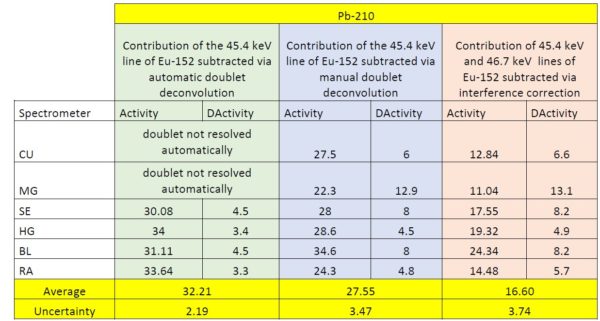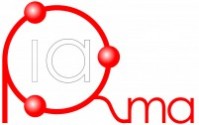Dear Participants of the IARMA Proficiency Tests,
We are pleased to inform you that the shipment of the test items packages for the upcoming 2023 IARMA Proficiency Tests has been successfully completed. Your dedication to quality assurance and proficiency is greatly appreciated, and we are excited to embark on this testing journey with you.

IARMA Team
Dear Valued Analytical Laboratories,
IARMA is offering a unique opportunity to enhance your laboratory’s proficiency in environmental radioactivity. Our UK-based company has designed four key tests:
- ERAD: Natural and Anthropogenic Radionuclides in soil and water.
- EGROSS: Gross Alpha/beta activities in water.
- ETRIT: Tritium in water.
- ECARB: Carbon-14 in water.
Join labs worldwide in demonstrating your capabilities and commitment to quality. Click Register to participate in our upcoming tests and receive a certificate of participation.
Deadline for registration: 01 July 2023.
Unlocking Excellence: IARMA's Proficiency Test Reports for ERAD, EGROSS, and ETRIT 2022 Now Available for Download!
Dear Valued Customers,
IARMA has recently released the final reports of the Proficiency Tests ERAD, EGROSS, and ETRIT for the cycle 2022. These tests were conducted to evaluate the analytical capabilities of laboratories in accurately determining natural and anthropogenic radionuclides, gross alpha/beta, and tritium in both water and mushrooms.
By participating in these proficiency tests, laboratories gain valuable independent evidence of their performance. The reports provide detailed insights into the strengths and weaknesses of their analytical processes, allowing them to identify and address any shortcomings that may have been detected.
The final reports not only present the results of the ERAD, EGROSS, and ETRIT proficiency tests for the cycle 2022 but also outline the methodologies and data evaluation approaches employed. This comprehensive information ensures transparency and helps laboratories understand the evaluation criteria used during the tests.
It is worth noting that the preparation and characterization of the proficiency test items were carried out in collaboration with esteemed institutions such as the Józef Stefan Institute (Slovenia) and the Environmental Research Institute (UK). This collaboration ensures the credibility and quality of the proficiency tests, providing laboratories with reliable benchmarks for their performance assessment.
IARMA offers convenient access to the final reports through the Customer Portal. Laboratories participating in the proficiency tests can easily download the reports from the portal, allowing them to review the detailed findings and recommendations. This user-friendly approach ensures that the valuable information contained within the reports is readily accessible to all participating laboratories for long time.
Disintegration Interference Puzzle: Resolving the Challenge of Pb-210 Activity Determination in the Presence of Eu-152
After the conclusion of the IARMA ERAD-PT-2022 Proficiency Test, a valuable feedback was received from a participant regarding a common challenge faced by multiple participants when attempting to determine Pb-210 in the presence of Eu-152 in the IARMA-137 Mushroom Test Item. This feedback shed light on an issue that hindered accurate measurements and called for further investigation. In this post, we dip into the difficulties of this challenge, explore the complexities associated with the interference of Eu-152, and present the analytical approaches taken to overcome this obstacle. By sharing these insights, we aim to enhance the understanding of Pb-210 analysis in the presence of Eu-152, offering valuable guidance for future assessments in similar scenarios.
The determination of the massic activity of Pb-210 in the mushroom sample IARMA-137 presented challenges due to the significant activity of Eu-152, which was also present in the sample.
Specifically, there were two energy lines of Eu-152 that were close to the 46.5 keV energy line of Pb-210. These energy lines corresponded to the X-ray lines of Sm-152, which is the daughter product of Eu-152. The X-ray lines, Kβ1 and Kβ2, had energies of 45.4 keV and 46.7 keV, respectively. If the spectrometer had good enough resolution, the Kβ1 line could be subtracted through proper deconvolution of the doublet at 45.4 keV and 46.5 keV. However, the Kβ2 line of Eu-152 at 46.7 keV completely overlapped with the gamma line of Pb-210 at 46.5 keV. Therefore, it was necessary to correct the calculated activity of Pb-210 for the interference caused by Eu-152 at 46.7 keV, which was not done in the automatic analysis procedure.
Multiple measurements were conducted using various spectrometers. The second column of Table 1 presents the individual results for the massic activity of Pb-210 obtained through automatic analysis and deconvolution of the doublet at 45.4 keV and 46.5 keV. The average value and combined uncertainty are also reported in the green set of data as shown in the Table below.

Table 1: The individual results for the massic activity of Pb-210
Upon receiving the evaluation report from IARMA, it became evident for the participant that the result for Pb-210 was not acceptable, with a relative bias of 78.9% and a Z-test of 7.9.
To address this discrepancy, further analyses were performed. Initially, the doublet at 45.4 keV and 46.5 keV was manually resolved to verify the results of the automatic analysis and the reported values. The manually obtained results, shown in the third column of Table 1 (violet set of data), were slightly lower but still consistent with the reported value within the uncertainty. However, in this analysis, the contribution of the Kβ2 line was not subtracted from the line at 46.5 keV.
In the second attempt, the contribution of Eu-152 at 46.7 keV was subtracted from the remaining Pb-210 area at 46.5 keV. This interference was not corrected during the automatic analysis procedure.
The final results, presented in the fourth column (orange set of data), confirmed that the calculated values for the massic activity of Pb-210 were systematically too high due to the incomplete resolution of the interference between Pb-210 and Eu-152 at the energy lines of 46.5 keV and 46.7 keV, respectively. It is worth mentioning that coincidence summing corrections for the 46.7 keV line of Eu-152 were separately calculated using the EFFTRAN efficiency transfer program.
The final corrected result for Pb-210 was determined to be (16.60 ± 3.74) Bq/kg, which agreed with the reference value (18.0 ± 0.54) Bq/kg, with a relative bias of -7.8% and a ζ-test of 0.37.
Based on this analysis, it can be concluded that when the massic activity of Eu-152 is comparable to or greater than the massic activity of Pb-210, evaluating the specific activity of Pb-210 solely from the line at 46.5 keV is challenging, as the contribution of the Kβ2 line of Sm-152 is not negligible and must be taken into account.
If you have experienced similar challenges or have feedback to share regarding the determination of Pb-210 in the presence of Eu-152 in the IARMA-137 Mushroom Test Item, we would appreciate your contact. Your insights are valuable, and together we can enhance our understanding of this complex issue. Please reach out to us with your feedback.
Introduction:
Measurement results are integral to making critical decisions in industries, environmental sectors, and food safety control. They provide essential insights for economic, industrial, and health activities. Particularly, environmental radioactivity measurements are pivotal in evaluating the quality and conformity assessment of water, food, and the environment.
The environment naturally contains both naturally occurring radioactive materials (NORM) and artificial radionuclides released through human activities. These “contaminants” can be in the form of alpha, beta, or gamma-emitting radionuclides.
Given the potential health hazards associated with the presence of radioactivity in the environment, countries worldwide have recognized the importance of addressing this issue. Many have adopted the World Health Organization’s guideline activity concentration for water quality.
In this context, IARMA Proficiency Tests, part of our annual worldwide Environmental Radioactivity Proficiency Testing Scheme, serve multiple purposes. They assist in identifying analytical problems, support participating laboratories in maintaining accreditation, and provide a platform for discussions on the analysis of natural and anthropogenic radionuclides.
Proficiency tests hold a vital role within the laboratory accreditation system, serving as a crucial quality assurance measure to ensure accurate and reliable analyses. These tests evaluate a laboratory’s ability to consistently produce dependable results and are instrumental in maintaining high-quality standards. In this post, we will emphasize the significance of proficiency tests within the laboratory accreditation system and explore their various benefits.
Ensuring Accuracy and Reliability:
At the heart of proficiency tests lies the objective of assessing a laboratory’s analytical performance against well-defined standards. By participating in these tests, laboratories can verify the accuracy and reliability of their methods, instruments, and personnel. The comparative nature of proficiency testing allows laboratories to compare their results with those of other competent laboratories, thereby identifying potential discrepancies or biases. This process helps uncover systematic errors, calibration issues, or methodological limitations that may affect the integrity of test results. By addressing these identified weaknesses and making necessary improvements, laboratories can ensure a consistently high level of accuracy in their analyses.
Validation of Competence:
Laboratory accreditation systems are designed to validate a laboratory’s competence and adherence to established standards and guidelines. Proficiency tests serve as an external validation tool that assesses a laboratory’s overall performance. By participating in these tests and achieving satisfactory results, laboratories demonstrate their commitment to quality and their ability to produce reliable results consistently. Such validation enhances the credibility and reputation of a laboratory, reinforcing the confidence of clients, regulatory bodies, and stakeholders in the laboratory’s capabilities.
Continuous Improvement:
Proficiency tests go beyond merely validating a laboratory’s competence; they also foster a culture of continuous learning and enhancement within laboratories. The feedback and comparative analysis provided through proficiency tests offer valuable insights into best practices, emerging trends, and technological advancements in the field. Laboratories can utilize this information to update their methodologies, adopt new techniques, and optimize their processes. Regular participation in proficiency testing enables laboratories to stay updated and adapt to evolving standards, ensuring that they remain at the forefront of their respective disciplines.
Regulatory Compliance:
Many laboratories are subject to regulatory requirements and standards specific to their industry or sector. Proficiency tests act as an objective and independent assessment mechanism, helping laboratories meet these regulatory obligations. Regulatory bodies often recognize participation in proficiency testing as a mandatory requirement for accreditation. By complying with these requirements and consistently performing well in proficiency tests, laboratories demonstrate their commitment to meeting quality standards, ensuring public safety, and adhering to legal and ethical guidelines.
Global Recognition and Collaboration:
Proficiency tests also play a crucial role in facilitating global recognition and collaboration among laboratories. By participating in these tests, laboratories can benchmark their performance against international standards, promoting harmonization and comparability of results. This benchmarking process helps establish a common understanding and a shared language for assessing analytical performance across different laboratories worldwide. Additionally, proficiency testing provides a platform for laboratories to showcase their proficiency on a global scale, fostering trust and facilitating international collaborations. Through these collaborations, knowledge sharing, cross-validation, and the advancement of scientific research and innovation can be promoted.
Conclusion:
Proficiency tests are an essential component of laboratory accreditation systems, strengthening the reliability and accuracy of laboratory results. By participating in these tests, laboratories can validate their competence, identify areas for improvement, and ensure compliance with regulatory standards. The continuous cycle of proficiency testing encourages a culture of learning, innovation, and quality improvement within laboratories. Ultimately, proficiency tests contribute to the overall credibility, trustworthiness, and integrity of laboratory operations, benefiting various industries, healthcare, and research endeavors worldwide.
Dear valued customers,
We are pleased to announce that the registration for IARMA proficiency tests is now open. As a UK-based company, we offer proficiency testing for laboratories worldwide. Our tests are designed to assess your laboratory’s proficiency in environmental radioactivity, including four (4) proficiency tests:
1- ERAD on the determination of natural and anthropogenic radionuclides in Hay and drinking water.
2- EGROSS on the measurement of gross alpha/beta activities in drinking and seawater.
3- ETRIT on the determination of tritium in water at an environmental level.
4- ECARB on the determination of Carbon-14 in water at an environmental level.
We invite you to participate in our upcoming proficiency tests to demonstrate your laboratory’s capabilities and ensure that your results are accurate and reliable. Our tests are carefully designed to assess your laboratory’s competence in various areas, and we provide a certificate of participation as a piece of evidence.
To register for the ERAD, EGROSS, ETRIT and ECARB proficiency tests, please use the links listed above and follow the registration process. Our team will be happy to assist you with any questions or concerns you may have.
We look forward to your participation in our proficiency tests and helping you achieve your laboratory’s quality goals.
Best regards,
IARMA Team
Dear IARMA Participants,
Please be informed that the IARMA Proficiency Test Reports for the 2022 cycle are now available at your Portal.
Thank you for your participation.
IARMA Team
Dear IARMA Customers,
As you were informed via email on 15 December 2022, the Individual Evaluation Reports for IARMA Proficiency Tests have been issued and can be downloaded from the IARMA Portal at the link: https://www.iarma.co.uk/contact/client-log-in/
Please check your spam folder in case you do not find our email in your inbox.
Should you have any question, please do not hesitate to contact us.
Many thanks for your participation in IARMA Proficiency Tests.
IARMA Team
Please be informed that the target date for the results reporting of IARMA proficiency test is 15 of November 2022.
Thank you.
The 13th International Conference on Tritium Science and Technology – Tritium 2022 was an opportunity to strengthen cooperation amongst scientists and engineers, to exchange the latest knowledge achieved on all scientific and engineering research in tritium science and technology, and to initiate future borderless collaborations.
IARMA has participated at this conference with an oral presentation presented by Dr Jasmina Kožar Logar, Jožef Stefan Institute, Slovenia.
To get your free copy of please send us your name and email.

